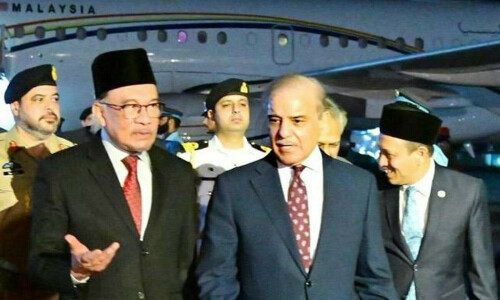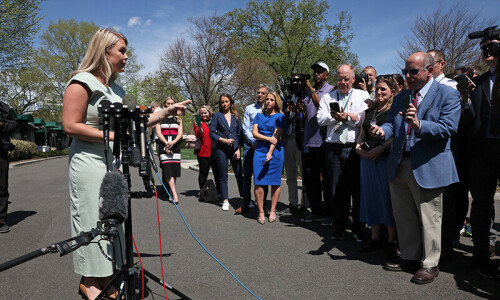• Of new taxes, Rs70bn to come from fertiliser duty, Rs45bn from hike in tax on buying, selling property, Rs30bn from increased tax on people earning above Rs200,000 per month
• Govt to cut spending by Rs85bn
• PDL to be raised from Rs50 to Rs60 per litre
• Rs80bn scheme to boost remittances
ISLAMABAD: The government has made several changes to next fiscal year’s budget, including fiscal tightening measures dictated by the International Monetary Fund (IMF) in a last-ditch effort to secure critical funding.
“Pakistan and IMF had detailed negotiations for the last three days as a last effort to complete the pending review,” Finance Minister Ishaq Dar told the house as he unveiled the changes on Saturday.
He said the government now aims to generate another Rs215 billion in taxes and cut spending by Rs85bn in the next fiscal year, without reducing the federal development budget or the salaries and pensions of government employees.
This will revise the government’s revenue collection target to Rs9.415 trillion and put total spending at Rs14.48tr, he said. The share of the provinces would be increased to Rs5.39tr from Rs5.28tr.
• Of new taxes, Rs70bn to come from fertiliser duty, Rs45bn from hike in tax on buying, selling property, Rs30bn from increased tax on people earning above Rs200,000 per month • Govt to cut spending by Rs85bn • PDL to be raised from Rs50 to Rs60 per litre • Rs80bn scheme to boost remittances
He hoped these and several other changes “will make our fiscal deficit much better” and insisted that the government had ensured that the new taxes would not affect the poor.
Mr Dar said the government had also lifted import restrictions enforced in December to cut the current account deficit, which has been one of the major concerns by the IMF to release the funds.
He said the allocation for the Benazir Income Support Programme was also revised from Rs450bn to Rs466bn for FY24. Besides, the petroleum development levy would be raised from Rs50 to Rs60 per litre.
The changes in the budget came a day after Prime Minister Shehbaz Sharif met IMF Managing Director Kristalina Georgieva on the sidelines of the Global Financing Summit in Paris.
The Fund’s ongoing loan programme agreed in 2019 is set to expire on June 30. Under the $6.5bn facility’s ninth review, negotiated earlier this year, the country has been trying to secure $1.1bn of funding stalled since November.
Mr Dar said that for the past few months, the nation was questioning whether the IMF’s ninth review would be successful or not, adding that he wanted to take the people into confidence on the matter. “I hope, God willing, that we will have an agreement with the IMF,” he said.
When Mr Dar presented the budget on June 9, he announced new revenue measures of Rs223bn in addition to all taxes worth Rs500bn introduced in a mini-budget in mid-February. The sum of new tax measures for the coming fiscal year now stands at Rs938bn.
The government hopes to achieve a 28pc higher revenue target for the next fiscal year based on projected economic growth of 3.5pc, average inflation of 21pc and revenue measures.
The autonomous growth in revenue — to come from GDP growth and inflation — is projected at Rs1.76tr in the next fiscal year.
The total outlay of the budget will now be Rs14.48tr.
Meanwhile, a statement issued by the PML-N said PM Shehbaz Sharif had held a third meeting with the IMF chief in Paris before his departure for London in which he had reiterated Pakistan’s commitment to complete the Fund’s programme.
Mr Dar said that as part of efforts to complete the review, a technical team from the finance ministry also held meetings with IMF officials over the past three days. It was agreed upon to implement additional taxation measures and reduce expenditures.Finance bill Mr Dar said the government had decided to keep the super tax intact, along with the 0.6pc tax on cash withdrawals from banks.
He explained that the newly introduced Section 99D in the Income Tax Ordinance was designed to enable a tax rate of up to 50pc on unexpected gains resulting from external factors.
He specifically mentioned that banks fell into this category and might be subjected to this taxation. He clarified that this tax applied only to the corporate sector and not to individuals.
Besides, a federal excise duty of Rs2,000 on inefficient fans will now be imposed six months later, i.e. from Jan 1, 2024. Mr Dar said this would give manufacturers some time to transition to more efficient technology.
He said the Senate had made 59 recommendations in the finance bill, including 19 general recommendations.
The government has formed a new three-member alternate dispute resolution committee. It will be headed by a retired judge from a high court or the Supreme Court; the other two members will be the income tax chief commissioner, and a taxpayer or their representative.
The committee will work to resolve 62,000 cases involving some Rs3.2 trillion currently stuck in various legal proceedings. The decisions made by the alternate dispute resolution committee will be binding on the FBR, while taxpayers will have the right to appeal.
Besides, the investment limit in the pension benefit account had been increased to Rs7.5m from Rs5m, he said.
Though the finance minister announced the new taxes in line with IMF but provided no details. It is expected that government will bring further tax amendments in the finance bill on Sunday.
Published in Dawn, June 25th, 2023















































